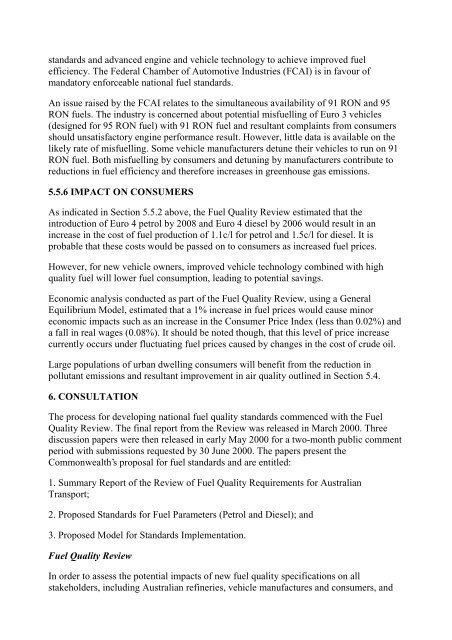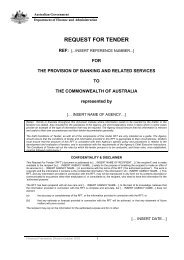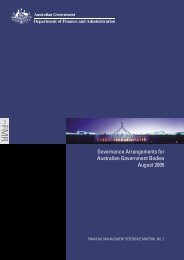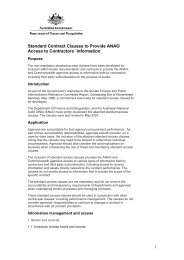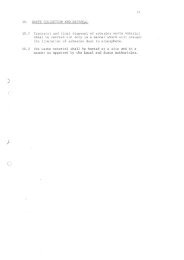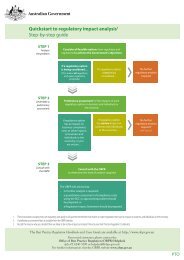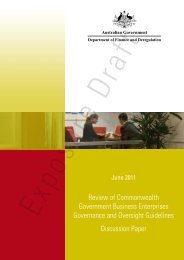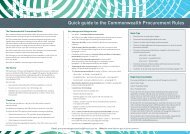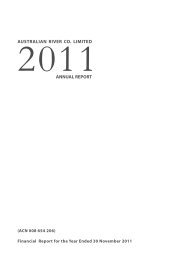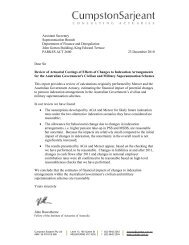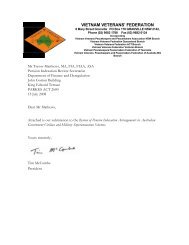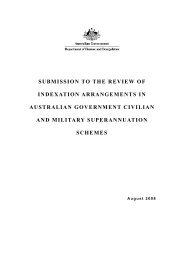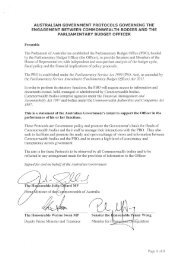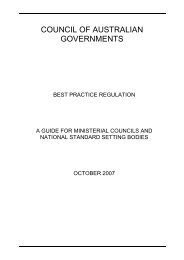National Fuel Quality Standards Regulation Impact Statement 1 ...
National Fuel Quality Standards Regulation Impact Statement 1 ...
National Fuel Quality Standards Regulation Impact Statement 1 ...
You also want an ePaper? Increase the reach of your titles
YUMPU automatically turns print PDFs into web optimized ePapers that Google loves.
standards and advanced engine and vehicle technology to achieve improved fuel<br />
efficiency. The Federal Chamber of Automotive Industries (FCAI) is in favour of<br />
mandatory enforceable national fuel standards.<br />
An issue raised by the FCAI relates to the simultaneous availability of 91 RON and 95<br />
RON fuels. The industry is concerned about potential misfuelling of Euro 3 vehicles<br />
(designed for 95 RON fuel) with 91 RON fuel and resultant complaints from consumers<br />
should unsatisfactory engine performance result. However, little data is available on the<br />
likely rate of misfuelling. Some vehicle manufacturers detune their vehicles to run on 91<br />
RON fuel. Both misfuelling by consumers and detuning by manufacturers contribute to<br />
reductions in fuel efficiency and therefore increases in greenhouse gas emissions.<br />
5.5.6 IMPACT ON CONSUMERS<br />
As indicated in Section 5.5.2 above, the <strong>Fuel</strong> <strong>Quality</strong> Review estimated that the<br />
introduction of Euro 4 petrol by 2008 and Euro 4 diesel by 2006 would result in an<br />
increase in the cost of fuel production of 1.1c/l for petrol and 1.5c/l for diesel. It is<br />
probable that these costs would be passed on to consumers as increased fuel prices.<br />
However, for new vehicle owners, improved vehicle technology combined with high<br />
quality fuel will lower fuel consumption, leading to potential savings.<br />
Economic analysis conducted as part of the <strong>Fuel</strong> <strong>Quality</strong> Review, using a General<br />
Equilibrium Model, estimated that a 1% increase in fuel prices would cause minor<br />
economic impacts such as an increase in the Consumer Price Index (less than 0.02%) and<br />
a fall in real wages (0.08%). It should be noted though, that this level of price increase<br />
currently occurs under fluctuating fuel prices caused by changes in the cost of crude oil.<br />
Large populations of urban dwelling consumers will benefit from the reduction in<br />
pollutant emissions and resultant improvement in air quality outlined in Section 5.4.<br />
6. CONSULTATION<br />
The process for developing national fuel quality standards commenced with the <strong>Fuel</strong><br />
<strong>Quality</strong> Review. The final report from the Review was released in March 2000. Three<br />
discussion papers were then released in early May 2000 for a two-month public comment<br />
period with submissions requested by 30 June 2000. The papers present the<br />
Commonwealth’s proposal for fuel standards and are entitled:<br />
1. Summary Report of the Review of <strong>Fuel</strong> <strong>Quality</strong> Requirements for Australian<br />
Transport;<br />
2. Proposed <strong>Standards</strong> for <strong>Fuel</strong> Parameters (Petrol and Diesel); and<br />
3. Proposed Model for <strong>Standards</strong> Implementation.<br />
<strong>Fuel</strong> <strong>Quality</strong> Review<br />
In order to assess the potential impacts of new fuel quality specifications on all<br />
stakeholders, including Australian refineries, vehicle manufactures and consumers, and


